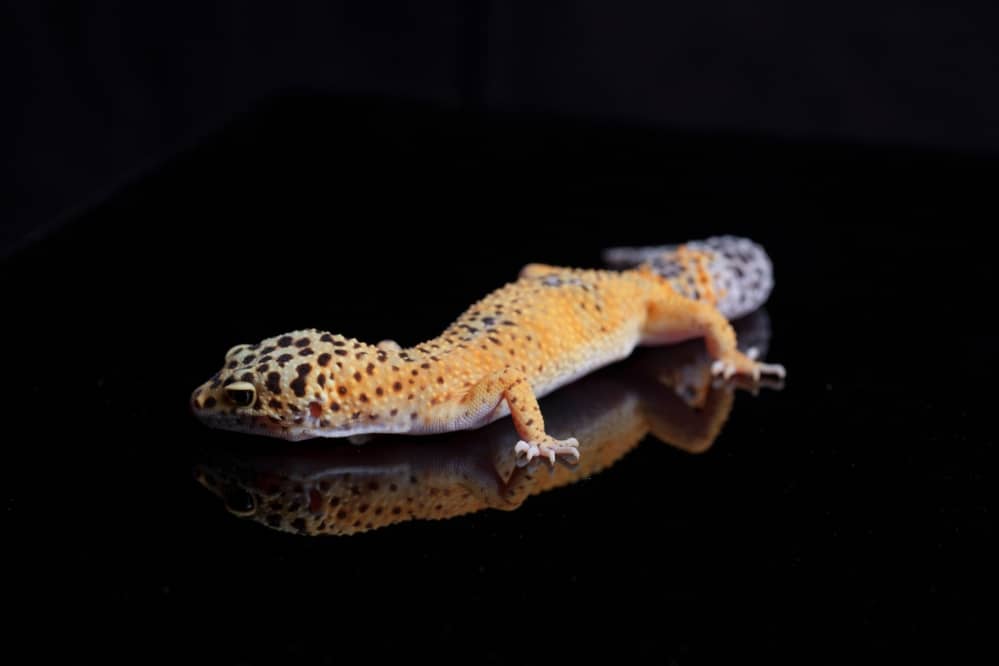Impaction is a relatively prevalent ailment in reptiles and leopard geckos in particular. It is one of the difficulties that veterinarians must regularly address. Unfortunately, if left untreated, leopard gecko impaction can be lethal. What exactly is Impaction? It is a condition that occurs when a leopard gecko’s digestive tract becomes blocked.
The obstruction inhibits the gecko from both defecating and eating. The digestive tract of a Leopard gecko can be obstructed by a semi-solid or solid substance. Identifying Impaction in its early stages can save the life of your gecko. Now that you have a general understanding of leopard gecko impaction let’s go into the most crucial facts. This will include causes, treatment, prevention, and treatment costs.
What exactly is Impaction?
Impaction is a medical disorder in which a mass of food, substrate, excrement, or tiny objects such as rocks obstructs the digestive tract. Due to intestinal obstruction, the animal cannot defecate.
When an animal becomes impacted, it will typically continue to feed generally for a short period until the digestive tract becomes severely impacted. At that point, it will cease eating and even drinking water. A newborn or juvenile gecko should defecate once daily, while an adult gecko should defecate roughly every other day.
However, if impacted, the gecko would defecate seldom or cease defecating altogether. You will be able to identify a gecko that has been significantly harmed by monitoring its bowel motions and observing its lethargic demeanor.
In most instances, the gecko will have an exceptionally bloated or inflated abdomen that is difficult to touch. This condition rapidly becomes troublesome as the Impaction stretches the gecko’s digestive tract and intestines, causing significant pain and stress. Organ failure, certain infections, and even death will result if left untreated.
How Can I Tell If My Leopard Gecko Has Been Impacted?
Early detection of Impaction is essential if the leopard gecko is to survive. But how can you recognize early-stage Impaction? Well, Impaction is accompanied by a variety of symptoms. The following are common symptoms and indicators to watch out for:
Symptoms
- Appetite loss
- Constipation
- Struggling to defecate
- Abdominal discoloration
- Lethargy
- Regurgitation
- Bloated stomach
- Difficulty breathing
You won’t miss any of these indications if you frequently handle or pet your leopard gecko. You will realize something is off with your gecko’s disposition and health.
Causes of Leopard Gecko Impaction
The leading causes of constipation are poor diet and improper husbandry. Remember that leopard geckos are fragile reptiles that require special care in captivity to avoid Impaction. Below are some of the most common causes of Impaction:
1. Loose Substrate
Adding a loose substrate to your gecko’s aquarium will only increase the chance of Impaction. When dining on insects and worms, the possibility of your leopard gecko absorbing the substrate is always high. Imagine what can occur when a gecko consumes a substantial amount of substrate. When loose substrates such as sand enter the gecko’s stomach, they solidify and cause Impaction.
2. A Lot of Mealworms
A large portion of a leopard gecko’s food consists of mealworms, yet feeding oversized mealworm beetles can result in Impaction. Remember that considerable mealworm beetles typically have a tough exoskeleton, making them difficult for your gecko to consume. Limit the number of mealworms you feed your gecko to prevent Impaction.
3. Dehydration
As with most animals, leopard geckos can get constipation if they do not consume sufficient water. Leopard geckos are indeed desert-dwelling species, yet they also require water for bowel movements. Do not expect that they will obtain water from insects or worms. You must maintain a dish of clean water within their enclosure.
4. Feeders With Rigid Shells
Besides mealworms, most hard-shelled feeder insects can easily cause Impaction in leopard geckos. This primarily affects infants and young children since their digestive systems lack the strength to break down the rigid shell.
5. Temperatures are Low
The surrounding temperature can affect whether or not your leopard gecko suffers from Impaction. As you know, leopard geckos require abdominal heat to digest food properly. There is an excellent probability that your gecko will not digest its food properly if the temperature in its enclosure drops.
6. Insufficient vitamin D supplementation
Vitamin D is essential for all vertebrates, including reptiles. Remember that leopard geckos require vitamin D3 or UVB illumination as a supplement. Providing your leopard gecko with the proper quantity of UVB will guarantee that its functions are operating correctly. Conversely, a deficiency in vitamin D can impair digestion and lead to constipation or Impaction.
How to treat Leopard Gecko Impaction?
Early detection of Impaction permits effective treatment. Sometimes Impaction might be so severe that even veterinarians cannot help. When your gecko is afflicted, we have created a list of the most typical treatments you can employ.
1. Provide a Hot Bath
Give your gecko a warm bath as the initial step. The water should be lukewarm to prevent the small animal from being burned. Warm baths should be administered twice per day to soften the impacted stool.
2. Using Olive Oil
According to studies, olive oil has been demonstrated to be an effective remedy for Impaction. In addition to acting as a laxative, it can provide natural lubricant to the digestive tract. Place two drops of olive oil on the gecko’s mouth or nose and let it lick it off.
3. Boost the temperature
If you feel that low temperatures have contributed to your gecko’s Impaction, take the following steps: The temperature can be increased to around 95 degrees Fahrenheit. This approach increases and accelerates metabolism.
4. Consult a veterinarian
If none of those solutions works, your only option is to schedule an appointment with your local veterinarian. Most veterinarians who treat reptiles will know precisely how to cure leopard gecko impaction. The veterinarian should be your last resort, but if your gecko is experiencing severe Impaction, you should take it there immediately.
How To Protect Leopard Geckos from Impaction
Before taking your gecko to a veterinarian, you should not wait for Impaction to occur. As the saying goes, prevention is preferable to cure. Below are a few precautions you may take to protect your leopard gecko from Impaction:
- Always supply fresh water in the gecko’s enclosure
- Provide vitamin D3 supplements or UVB illumination for your leopard
- Ensure that your gecko exercises regularly
- Use firm substrate or fine-grained sand in your gecko’s tank
- Avoid feeding worms and insects with a hard exoskeleton
- Provide adequate underbelly warmth
- Feed your gecko in a particular spot or dish to prevent unintentional intake of substrate
Conclusion
We hope you are now better equipped to detect, treat, and prevent future impaction situations. Always visit a veterinarian if you are uncertain about your gecko’s health.

